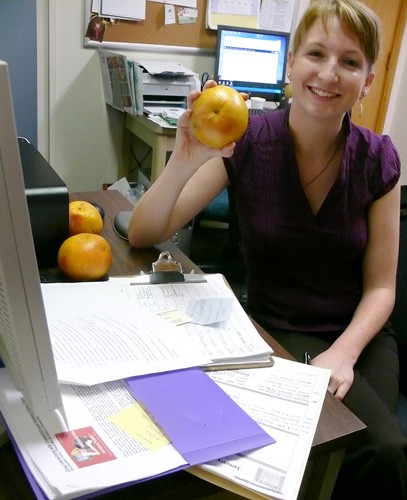This spring, the UA’s Department of Nutritional Sciences is conducting a study to see if eating grapefruit can help people lose weight.
Associate professor Cynthia Thomson and graduate student Caitlin Dow have teamed up to perform a research experiment in which 75 people between the ages of 25-50 years old will consume grapefruit daily for six weeks.
The participants will complete a daily fruit and vegetable diary. They will also take blood and urine samples to show if eating grapefruit is reducing their oxidative stress levels.
Dow hopes to see positive results, but there are some factors that could prevent any drastic results: “”We are hoping for weight loss, but we are not controlling calorie intake so we are not necessarily expecting that we will see that. But we are expecting to see lower levels of oxidative stress and lower levels on inflammation.””
The UA’s College of Agriculture and Life Sciences has partnered with another agriculture research university, Texas A&M. Texas A&M has people growing select crops which they want to be evaluated for health benefits.
If they can prove that a fruit or vegetable has health benefits, it helps with the marketing of that fruit or vegetable.
“”My partnership with them has mostly been in the area of cancer and weight control. Those are the target health outcomes they are interested in,”” Thomson said about her previous work with Texas A&M.
There has been one previous study on grapefruit in La Jolla, Calif., but Thomson has decided to take the study a step further.
“”When you go to the literature, only one paper in 2006 has done it. They gave capsules. They saw a weight loss of 3 lbs. in 12 weeks. So I thought we would follow up on it. We can hypothesize what will happen,”” she said. “”It could be that we see nothing, or we could see a negative impact from the grapefruit.””
Thomson and Dow plan on measuring the oxidative stress level for each participant before the experiment and seeing how it changes after daily consumption of grapefruit.
They chose ruby red grapefruits because the darker or brighter the fruit or vegetable, the higher the antioxidant levels.
“”There are two molecules that are higher in ruby reds than in white grapefruit: Lycopene and Naringenin. This allows us (to) give a greater effect than if we used white grapefruit,”” Dow said.
Dow took Thomson’s Advanced Nutritional Sciences class after completing her undergraduate studies at Northern Arizona University.
Dow said she hopes that their paper will be published in a nutritional science or food and agriculture journal.
“”Dr. Thomson is a pretty incredible scientist, and she put in the grant for the study, and I think it is one of those things that has been wondered about for a long time and no one has just done a study on it. So she decided to take the initiative to look into it,”” Dow said.
Thomson and Dow have different roles in the hopes of proving the rumors that surround grapefruit. Thomson,the principal investigator, came up with the idea and the grant for the study. Dow does more of the interaction with the participants, creating their schedule and keeping track of the results they are receiving.
They only have 28 participants at this time, falling short of their goal of 75. Due to the small number of participants, this study is considered a pilot.
Thomson and Dow are unsure if there will be a follow-up study.
Students seem interested in the results but not in being a subject.
“”I really love grapefruit, but I don’t think I would be willing to eat it every day for a six-week period,”” said Molly Preece, a pre-education sophomore. “”However, I am very curious to see if they actually can see if it promotes weight loss.””
The experiment will be finished around the end of March to mid April 2010, because that is when grapefruit goes out of season.









